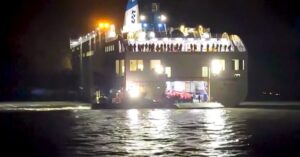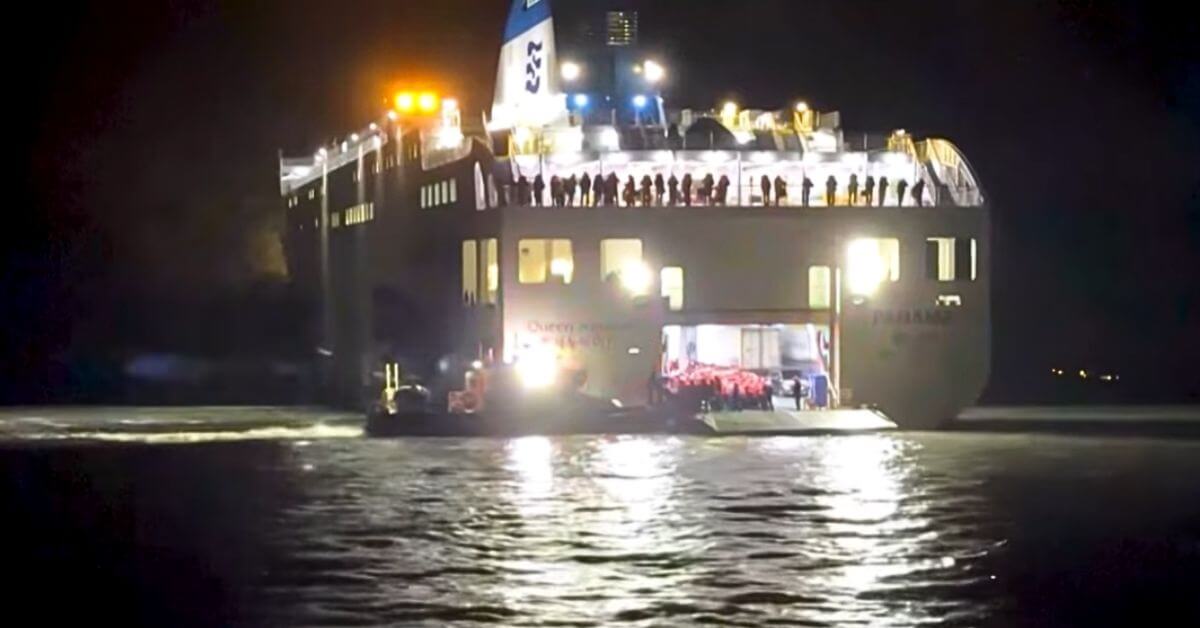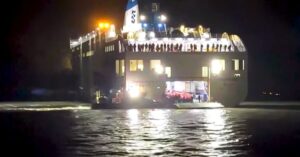
Sweden To Select Supplier For Country’s Largest Surface Warships In Almost Half A Century
November 25, 2025
HD Hyundai Secures Largest Container Ship Order In 18 Years Worth USD 1.4 Billion
November 25, 2025

The captain of the passenger vessel Queen Jenuvia 2 is facing serious negligence charges after a Coast Guard investigation revealed that he had never entered the bridge while navigating a narrow and hazardous channel more than 1,000 times, including during a grounding incident last week that left dozens injured.
The ship, carrying 267 people, ran aground near Jokdo, an uninhabited island off Jangseondo in Shinan County, South Jeolla Province, at around 8:17 p.m. on 19 November. A total of 78 people sustained injuries and were taken to hospital following the impact.
According to the Mokpo Coast Guard, the captain, in his 60s, had not worked on the bridge during any of the vessel’s transits through the accident zone since 28 February last year, despite passing through the area more than 1,000 times.
Officers found that he was only present on the bridge during departure from Jeju at 4:45 p.m. on the day of the grounding and did not return until after the collision had already taken place.
Investigators confirmed that the captain had been resting in his cabin adjacent to the bridge at the time of the accident. He told officials he had been monitoring the ship’s navigation from the cabin, where a system similar to the bridge display was installed. He also stated that digestive problems had prevented him from observing the route properly that evening.
The Coast Guard has applied for a detention warrant for the captain on charges of gross negligence resulting in injury and violating the Seafarers Act, which requires a captain to directly oversee navigation during departures, arrivals, narrow channels or areas at risk of collision or grounding.
The first officer, in his 40s, and the Indonesian helmsman, also in his 40s, were on duty when the grounding occurred. Investigators said that both of them relied on the ship’s automatic navigation system and steered the vessel directly towards Jokdo.
Video Credits: APT/YouTube
The inquiry found that the first officer had been distracted by his mobile phone, contributing to the failure to change course in time.
Both men were arrested on 22 November on suspicion of gross negligence resulting in injury. A simulation conducted by Mokpo National Maritime University indicated that the vessel should have begun turning at least 500 metres before the island to avoid impact.
Investigators determined that the first officer issued a delayed course-change order only 13 seconds before the grounding.
The Coast Guard is also examining the actions of a Mokpo Vessel Traffic Service (VTS) controller after confirming that the route deviation alarm, which alerts staff when a ship strays from its designated track, had been disabled prior to the incident.
The controller told investigators that he had not personally switched off the alarm and explained that the system frequently triggered for small fishing boats under 20 metres, which are not required to follow fixed routes, making it difficult to manage other vessels. The West Sea (Yellow Sea) Coast Guard Headquarters also stated that repeated alerts had disrupted monitoring.
At the time of the accident, the controller had been responsible for overseeing five ships, including Queen Jenuvia 2. He was said to have been focused on another large vessel that had also deviated from its course. Officials said the VTS did not notice the ferry’s deviation until the first officer reported the collision.
The controller is expected to face charges of professional negligence resulting in injury.
Seven crew members have been questioned as references as the Coast Guard continues to examine the responsibilities of the ship’s officers and shore-based monitoring authorities.
Investigators highlighted that the accident occurred in a narrow and rocky stretch of water where the captain was legally required to supervise navigation directly.
References: The chosun, koreajoongangdaily
Source: Maritime Shipping News


